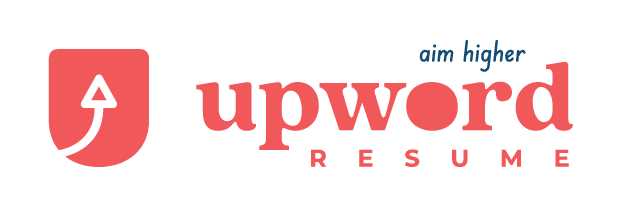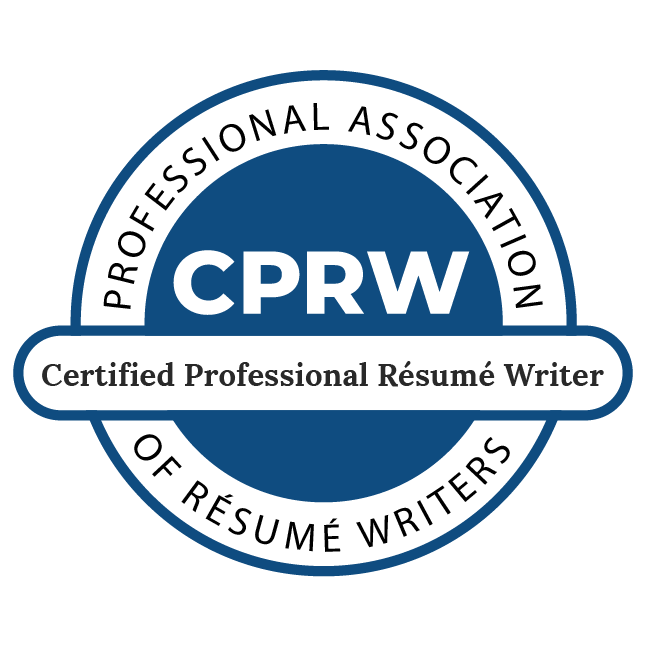Don’t turn your resume over to the AI bots just yet. ChatGPT is great at quickly creating an elementary resume, but the results are just a foundation that still needs a human touch.
ChatGPT is the AI content creator that’s taking the web by storm. It’s an optimized language model that scours the web and draws on relevant models to create content – almost instantaneously.
ChatGPT is definitely changing the world of content creation but the question is HOW will it be used? After all, why hire a resume writer if a bot on your web browser can create your resume in seconds, for free?
To see what all the hype is about, I decided to give ChatGPT a number of resume-writing tasks to test its chops. It was a bit of a rocky road, to be honest…
With my first request, “create a resume tailored to a job description,” it gave me a 5-paragraph cover letter addressed to “Dear Hiring Manager.” But I tried a few more queries (ChatGPT is meant to learn from feedback) and here are the results:
First, I input some raw work history and asked ChatGPT to turn it into a resume.
I used the notes submitted by one of Upword Resume’s clients in their initial intake form. ChatGPT translated those rough notes into resume form, creating a resume that contained an Objective statement, a Summary section, and Work History divided into Responsibilities and Accomplishments.
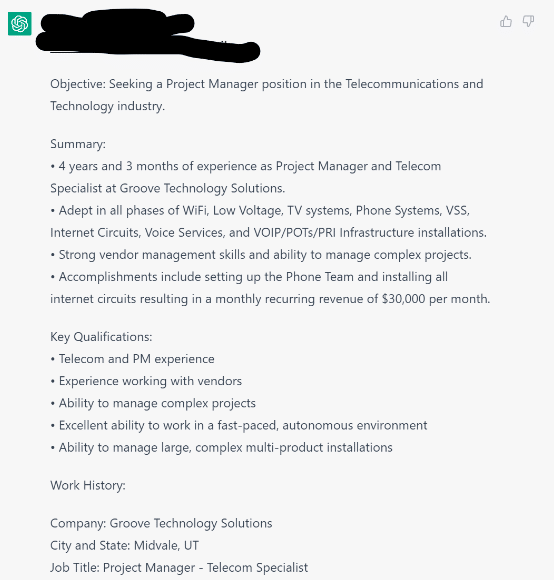

This is a great start. First, by putting notes into the structure of a resume, ChatGPT provided something to build on. And it saved the basic work of building the initial resume draft.
In addition, the ChatGPT resume included lots of relevant technical terms such as “WiFi, Low Voltage, TV systems.”
But would I recommend submitting this resume for a job application?
Not at all.
The biggest problem I see with ChatGPT’s resume is its focus on skills over accomplishments.
The resume ChatGPT created is a laundry list of tasks. It doesn’t prioritize the most important qualifications and it doesn’t emphasize accomplishments or outcomes.
For comparison purposes, here’s the resume we created at Upword Resume for this same client.


We had the advantage of a phone call with the client to determine their career goals and draw out relevant accomplishments.
So rather than listing “WiFi, Low Voltage, TV systems,” the human-written resume includes deliverables such as “proven ability to drive revenue and company growth.”
An effective resume always goes beyond tasks and describes value. ChatGPTdid not make that distinction and treated low-level skills on par with high-level accomplishments.
Next, I asked ChatGPT to optimize resume keywords for a specific job description.
I gave ChatGPT a resume and a related job description and asked it to tailor the resume to the job description.

Because many companies put incoming resumes through an AI keyword scanner as a preliminary screening, it’s smart to optimize your resume’s keywords for each job application. This can be a time-consuming process. I wanted to see if ChatGPT could handle that step of resume optimization—after AI should be able to optimize a resume for AI.
So how well did ChatGPT align the resume with the job description? To give myself a baseline, I first ran the resume through JobScan to assess its keyword match. The initial resume received a 38% match score. That’s pretty average for a not-yet-customized resume. At Upword Resume, our goal would be to raise that score to 60% or higher.
After ChatGPT followed my prompt to customize the resume for the provided job description, I ran the results through JobScan. This time I received a 29% match score on JobScan—that’s 9% lower than the original.
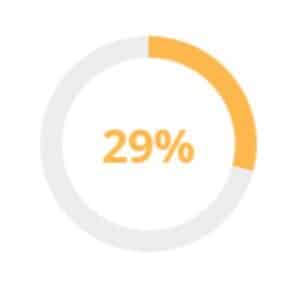
I tried again (ChatGPT allows you to “regenerate results”) and this time it got a 34%—better, but still lower than our original.
Syncing the keywords of a job description with your resume seems like an area where ChatGPT would shine. But ChatGPT didn’t effectively align the keywords of a job description with a resume.
And finally, I asked ChatGPT to identify the top qualifications for a role.
I gave ChatGPT a job description and asked it to identify the most important qualifications for the role.
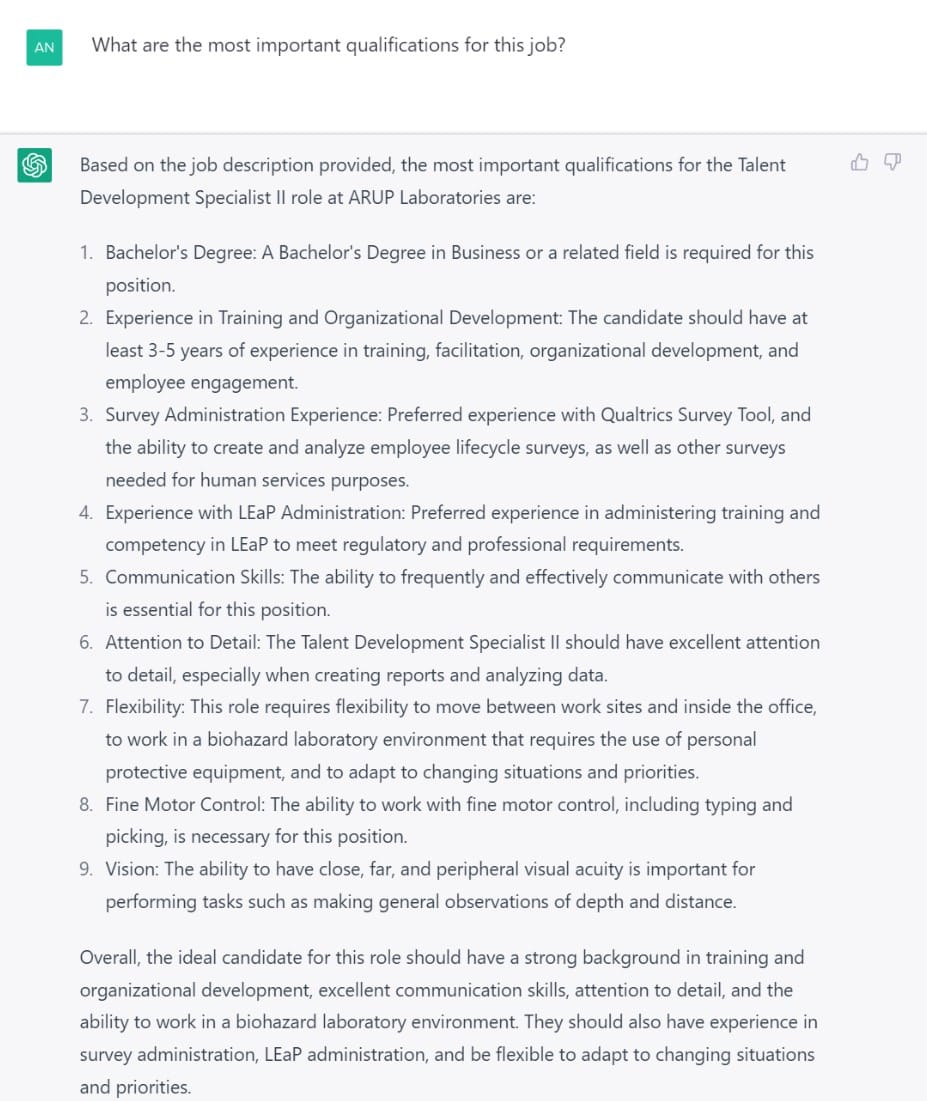
Much of the list ChatGPT generated is lower-level information. Items like “Fine Motor Control” and “peripheral visual acuity” are minimum requirements that won’t help advance your application.
A bachelor’s degree is an important qualification for the role, but most applicants are likely to have that. So it’s not a big differentiator in terms of your resume.
So I narrowed my focus and asked for the top 3 qualifications:
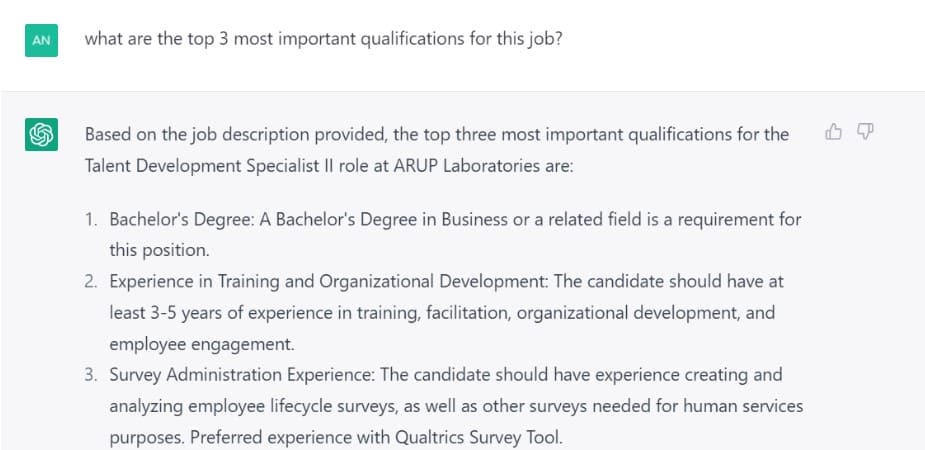
This eliminated items like visual acuity and fine motor skills, but the list remained focused on the baseline qualifications for the role, such as a bachelor’s degree and 3-5 years of experience.
The purpose of a resume is to show not just that you have the minimum qualifications for the role, but that you’re the top candidate who is most likely to deliver value for the employer—that means going beyond experience to focus on results.
The content generated by ChatGPT is a good starting point to get you going. Keywords such as, “Training and Organizational Development,” “Facilitation,” and “Employee Engagement” should definitely appear in the resume.
But for the resume to put you in the running, it also needs to use the Magic Yardstick and answer the question, “How do I create value for the employer?” ChatGPT wasn’t effective and identifying the value an employer is seeking for a specific role.
The bottom line when it comes to using AI on your resume?
ChatGPT underperforms in creating resumes for AI (ATS filters looking for keyword matches OR for humans looking for accomplishments.
To be fair, tools like ChatGPT are only as good as the data they receive. If you input basic tasks, you won’t get a resume focused on accomplishments. It’s that transition to higher-level skills that are a huge focus of our work at Upword Resume. Our clients come to us not just because they don’t know how to format a resume, but because they need help developing the right content for their resume.
That’s why a phone consult between resume writer and client is so essential to our process. In that person-to-person conversation, we can form that human connection, identify strengths and outcomes, and develop the targeted content that comprises a results-generating resume—one that goes beyond what AI can pump out.
That’s not to say that tools like ChatGPT can’t be useful in your resume-writing process. If you’re hitting writer’s block with your resume and don’t know where to begin, using ChatGPT is a great starting point. Give it your rough notes and use the draft or keyword lists it creates to get the process started. But don’t stop there.
You need a resume that’s aligned with your personal brand, showcases results and accomplishments in every section, and addresses exactly what recruiters are looking for. For that, chat with us at Upword Resume.
We’re pros at creating resumes that stand out from the crowd, and we’ve helped thousands of clients land new and better jobs along the way!
